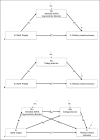Association between Marginally Low Birth Weight and Obesity-Related Outcomes and Indirect Effects via Attention-Deficit Hyperactivity Disorder and Abnormal Eating
- PMID: 34915511
- PMCID: PMC9021619
- DOI: 10.1159/000520902
Association between Marginally Low Birth Weight and Obesity-Related Outcomes and Indirect Effects via Attention-Deficit Hyperactivity Disorder and Abnormal Eating
Abstract
Introduction: Evidence of the association between children born with marginally low birth weight (MLBW) and obesity-related outcomes was controversial, and our study aimed to examine the role of attention-deficit hyperactivity disorder (ADHD) and/or abnormal eating in these associations.
Methods: A retrospective cohort study consisting of 677 Chinese children was conducted. Obesity-related outcomes (body mass index [BMI], waist circumference [WC], skinfold thickness [SF], body fat, blood pressure, lipids, and blood glucose), behaviour problems (ADHD and eating behaviour) and birth weight were collected. Mediation analyses were used to explore whether ADHD and/or abnormal eating was an intermediary factor in the MLBW-OB relationship.
Results: Children with MLBW tended to have higher SF, triglycerides, fasting blood glucose, waistline, body fat, and abdominal obesity risks. Birth weight was negatively related to obesity-related outcomes, and the associations were mediated, partially, by the increased risk of ADHD or abnormal eating behaviour after adjustment for the BMI Z score. Furthermore, lower birth weight predicted higher WC indirectly through emotional overeating caused by ADHD (β: -0.10; 95% confidence interval: -0.19, -0.01).
Conclusion: Our study suggests the hypothetical role of ADHD and abnormal eating as underlying mechanisms in the association between MLBW and obesity-related outcomes, providing novel scientific evidence for childhood development interventions.
Keywords: Attention-deficit hyperactivity disorder; Birth weight; Eating behaviour; Metabolic syndrome; Obesity.
© 2021 The Author(s) Published by S. Karger AG, Basel.
Conflict of interest statement
The authors declare no conflict of interest. The funders had no role in the design of the study; in the collection, analysis, or interpretation of data; in the writing of the manuscript; or in the decision to publish the results.
Figures


References
-
- NCD Risk Factor Collaboration (NCD-RisC) Worldwide trends in body-mass index, underweight, overweight, and obesity from 1975 to 2016: a pooled analysis of 2416 population-based measurement studies in 128.9 million children, adolescents, and adults. Lancet. 2017;390((10113)):2627–2642. - PMC - PubMed
-
- Hovi P, Vohr B, Ment LR, Doyle LW, McGarvey L, Morrison KM, et al. Blood pressure in young adults born at very low birth weight: adults born preterm international collaboration. Hypertension. 2016;68((4)):880–7. - PubMed
Publication types
MeSH terms
Substances
LinkOut - more resources
Full Text Sources
Medical
Miscellaneous

